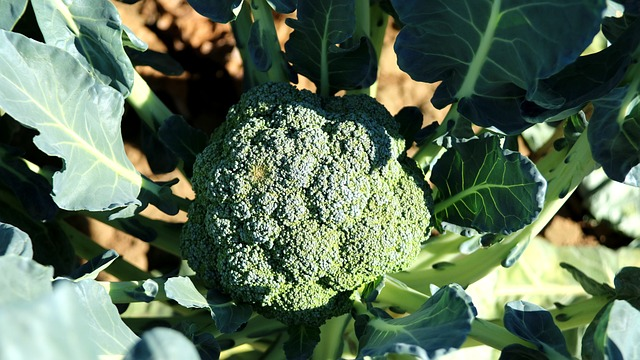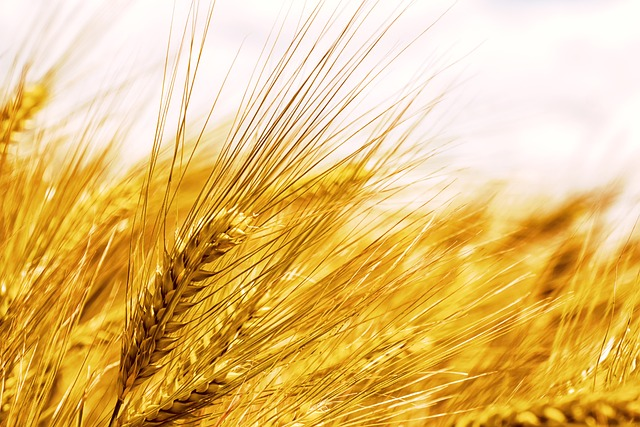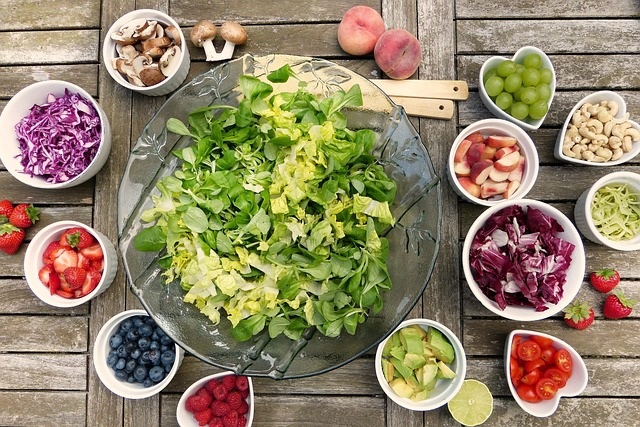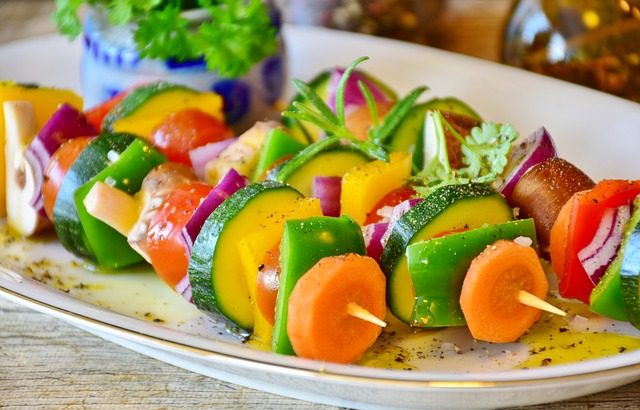Vegan Globetrotter is supported by our audience. When you purchase through one of our links, we may earn a small affiliate commission. As an Amazon Associate I earn from qualifying purchases. Your cost is not affected.
==================
Feeling achy and not well? Has your doctor said that you have inflammation? This often chronic condition causes many health issues and can lead to early death. Try adding foods that fight inflammation to your daily diet. It’s an important step to feeling better and living a healthier, happier life!
List of Foods that Fight Inflammation
Who should try an anti-inflammatory diet?

Buddha Bowl
Doctors are learning that one of the best ways to reduce inflammation lies not in the medicine cabinet, but in the refrigerator. By following an anti-inflammatory diet you can fight off inflammation for good
Starchy Vegetables, Including Legumes
Starchy vegetables provide one of the best sources of anti-inflammatory foods. These include potatoes, sweet potatoes, and legumes like beans, lentils, and peas. They are packed with essential vitamins and minerals that help fight inflammation naturally.
How do starches fight inflammation?
Fiber might well prove to be your best friend in your fight against inflammation. It helps reduce the amount of unhealthy cholesterol in your body, which can lead to decreased inflammation. Additionally, fiber has been shown to promote healthy bacteria growth in your gut, helping to improve your overall health.
List of Starchy foods that fight inflammation
- potatoes with the skin
- sweet potatoes with the skin
List of Beans and Legumes
- soybeans (edamame) and the products from them (tofu, tempeh)
- chickpeas
- lentils
- pinto beans
- other beans
How do starchy foods fight inflammation?
Fiber is a key factor in starchy foods. It works to reduce inflammation in two ways: first, it helps to trap excess cholesterol and bile acids in the gut, thus preventing them from entering your bloodstream.
Second, it helps promote the growth of beneficial bacteria in your digestive system. This is important because these bacteria help protect against harmful bacteria which can lead to inflammation. Additionally, some starches contain antioxidants which have anti-inflammatory properties. For example, whole grains contain phytochemicals that can help reduce inflammation and may even protect against some forms of cancer.
Eating a diet rich in starches is an important part of reducing inflammation and promoting overall health.
Omega 3 fatty acids
Omega 3 foods fight inflammation by reducing the levels of certain proteins that cause inflammation in the body. But they help in other ways, too. Research shows that Omega 3 fatty acids also help maintain healthy blood vessels and reduce risk factors for cardiovascular disease.
Most people think of fatty fish for a source of omega 3’s. But vegans can still get plenty of omega 3’s from plant food sources. Vegan (plant-based) sources of omega-3’s are found in walnuts, chia seeds, and flaxseeds. In fact, many of these provide more omega 3’s than the fatty fish.
Omega-3s help reduce inflammation by suppressing the production of pro-inflammatory cytokines like interleukin-6 (IL-6). Studies have shown that a diet rich in omega-3s can help lower the risk of chronic diseases such as heart
The Anti-Inflammatory Diet
Many vegetables are packed with nutrients and anti-inflammatory compounds. They can also help reduce inflammation in the body, which is especially important for preventing cancer. Cruciferous veggies include kale, cauliflower, cabbage, Brussels sprouts, broccoli fight inflammation and help your body recover. Thus, ensure that your diet includes plenty of starches and complex carbohydrates, as well as omega-3 fatty acids.
Bring on the leafy greens!
Dr. Fuhrman is well-known for his saying that the salad is the main dish. He encourages people to eat greens such as romaine, spinach, broccoli, kale, and other leafy greens as the main part of their diet.
His reasoning? They provide high nutrition without the inflammatory response. Simply put, these foods, often served raw or lightly steamed, provide an important base to our daily diet.
Does that mean you need to eat a pound of spinach every day? Of course not! but choosing a variety of leafy greens to enjoy every day helps ensure a good balance in your diet. That in turn helps prevent the effects of inflammation.

Don’t throw out the leaves
And speaking of leafy greens, did you know that many vegetables have flavorful and nutritious leaves, too? It’s true. When growing broccoli, for instance, don’t through out those bountiful leaves. They can be enjoyed raw, steamed, or sauteed for a very flavorful dish. For those who prefer their greens in a soup, broccoli greens may be added to your favorite soup or stew, too. Treat them as you would spinach, kale, or cabbage.
Inflammatory foods
Which foods might increase your risk of inflammation? Studies have found that certain foods, such as processed and refined carbohydrates, sugary drinks, saturated fats, and red meats can worsen inflammation. To reduce your risk for chronic illnesses like heart disease and cancer, it is important to limit these types of food from your diet. Additionally, avoiding trans-fats (found in fried foods) helps reduce the risk.
What are the refined carbs?
Foods that have been modified or processed often inflict inflammation. Refined carbs include processed foods and grains that have fiber removed. Most of us grew up with white rice, for instance. But white rice is merely brown rice that has had the fibrous outer portion removed. While it might be more easily digested, it also converts quickly into a sugar. Without the fiber to help move it, it causes more harm than health.
Similarly, processing other grains also removes the helpful fiber that our bodies need to combat the inflammatory response. Choose whole grains over processed ones. And keep all food in the most natural state possible. Avoid overly processed foods as they increase the inflammatory response in our body.
Whole Grains
By now, most of us know that whole wheat is far superior to white flour. White flour is simply wheat that has had that nutritious outer portion removed. Often you will see a label say “enriched flour”. That means that they have stripped away the bran portion which contained the vitamins and minerals, then added some of the missing nutrition into the flour, usually from a different source.
Why not just leave the original intact?
We have become used to eating refined foods such as white rice and white bread. Americans and others expect their foods to have that more refined texture and flavor. Or should I say lack of flavor?
In fact, the bran portion of the wheat is chewier and has more depth of flavor. For some, used to processed foods, bran seems heavy or too earthy. However, once your taste buds adapt to the extra flavor, you may find that white flour products are quite tasteless.
other grains
Wheat and rice do make up a major part of our diet in the United States. But other grains should be considered, too.
We use oats in our morning oatmeal. But we also use them as a prominent ingredient in our oat burgers. They shine nicely as part of some desserts such as fruit crisp. We often grind them up into other foods, too.
Our family loves barley stew. We use hulled barley to retain as much of the goodness as possible. Unhulled can be used but is a bit harder to digest, in our experience. However, we never use pearled barley as that is the processed type, devoid of much of the nutrition.

More grains to include
We keep a few other grains to use in our weekly planning. Some that boast incredible benefits include:
- Amaranth
- Barley
- Buckwheat/Kasha
- Bulgur
- Corn
- Farro
- Millet
- Oats
- Quinoa
- Rice (Black, Brown, or Red)
- Wild rice

Nuts and Seeds
Some of our best fats, including the omega 3’s are found in nuts and seeds. You might not want to live on walnuts and sunflower seeds, but adding a few of these to your meals or as snack foods helps bring powerful anti-inflammatory benefits. Just a handful each day shows incredible anti-inflammatory effects and lowered inflammation.
The health risks of inflammation
Which foods might increase your risk of inflammation? Studies have found that certain foods, such as processed and refined carbohydrates, sugary drinks, saturated fats, and red meats can worsen inflammation. To reduce your risk for chronic illnesses like heart disease and cancer, it is important to limit these types of food from your diet. Additionally, avoiding trans-fats (found in fried foods) helps reduce the risk.

What are refined carbs?
Foods that have been modified or processed often inflict inflammation. Refined carbs include processed foods and grains that have fiber removed. Most of us grew up with white rice, for instance. But white rice is merely brown rice that has had the fibrous outer portion removed. While it might be more easily digested, it also converts quickly into a sugar. Without the fiber to help move it, it causes more harm than health.
Similarly, processing other grains also removes the helpful fiber that our bodies need to combat the inflammatory response. Choose whole grains over processed ones. And keep all food in the most natural state possible. Avoid overly processed foods as they increase the inflammatory response in our body.

Other foods to avoid on anti-inflammatory diets
Most people know that sodas are filled with sugars and often salt. But did you know that most sports drinks also contain too much salt and added sugar? Avoid all sugary beverages may seem challenging at first, but try some alternatives such as water with a spritz of lemon.
For many, fried chicken, french fries, and buffalo wings have become weekly staples. But all of these cause an inflammatory response. Check out our recipes on Vegan Globetrotter for flavorful and healthy diet options. Plant-based foods that fight inflammation offer more flavor options, too!
Other fried foods should also be avoided. However, you might try air-frying for a healthy diet alternative. Some foods, including many fried foods, contain large amounts of saturated fat. These not only clog your arteries but also lead to chronic disease and inflammation.
Why avoid inflammatory foods?
We talk about avoiding inflammatory foods. What exactly do they do to our body? What health risks do they cause? Why choose an anti-inflammatory diet?
Inflammatory foods work to destabilize the homeostasis of our body. They overload our systems and cause an inflammatory response in order to process them. This can lead to a range of health issues, from digestive disorders to increased risks of heart disease and other types of cardiovascular disease and certain cancers.
People eating diets high in inflammatory foods are more apt to experience arthritis, heart disease, and stroke. Even if they avoid these fatal diseases, they often live with acid reflux, GERD, and other digestive ailments.
For more on the best and worst foods for inflammation, check out this article.

Choose a diet high in anti-inflammatory foods
Incorporating plenty of fresh fruits, vegetables, and plant proteins into our diet can help keep our bodies in a healthy state and minimize the negative effects of inflammation. Additionally, adding in plant sources of omega-3 fatty acids aids in combatting inflammation.
Other advantages of anti-inflammatory diet
We’ve been focusing on anti-inflammatory foods to help avoid or fight chronic inflammation and fatal or chronic diseases. But incorporating these foods into a healthy diet offers other health benefits, too.
An anti-inflammatory diet focusing on anti-inflammatory foods helps prevent weight gain. We know that being overweight or obese hinders our immune system and often leads to problems beyond chronic inflammation.
When eating inflammatory foods, weight gain is often the first step toward metabolic syndrome, irritable bowel syndrome, rheumatoid arthritis, and other inflammatory diseases.
By eating enough fruits and vegetables, and other anti-inflammatory foods, we empower our immune system to fight chronic disease. Foods containing anti-inflammatory compounds enable our immune system to combat inflammation and chronic health condition association.

How do you know if you’re experiencing inflammation?
Even before chronic diseases set in, the immune response is seen. Signs of inflammation include redness and swelling, fatigue, headaches, joint pain, stomachaches, and fever. These early symptoms should not be ignored – instead, we should take steps to counter the inflammation before it leads to further health issues.
Steps to take to avoid inflammatory conditions
First, take note of your diet. Scale back on the processed foods. These pro-inflammtory foods are often part of the typical american diet, but they don’t have to be. I would start with the ultra-processed foods. Bakery pastries, donuts, and even cookies and cakes often prove to promote inflammation in a major way.
If you still eat meats, consider forgoing deli meats, hot dogs, and other processed meats and red meats. Better yet, learn to enjoy a plant-based diet! It may take a little getting used to, but reaping the anti-inflammatory benefits makes it worth the effort. And I have never met a person who regretted learning to enjoy whole foods and the best anti-inflammatory foods.

Mediterranean diet
Now, take a look at your diet. Many start by moving toward the Mediterranean diet. While plant-based foodies avoid fish and dairy, some find the stepping stone approach works well for them. It does take them away from inflammatory markers and toward whole foods. And you avoid processed meats as a starting point.
More details on anti-inflammatory foods in this article
DASH diet
Why not start with the DASH diet? Some people do. But while DASH certainly provides some foods to eat for lowering inflammation, it does not do enough, in my own opinion. It seems that DASH is made for those who want to dip their toe in but really need to be immersed.
That said, you will reap some benefits and help lower systemic inflammation on DASH. And you should have a reduced risk of many chronic diseases. I just don’t see that DASH goes far enough in promoting the ideal diet for health. It still allows pro-inflammatory foods and meat-based lean protein.
Try a diet proven to reduce inflammation
Why not move toward a diet that doesn’t just reduce the risk of some health conditions? Yes, it might be a challenge at first. But moving toward a plant-based diet offers incredible health benefits and a chance to live many years beyond that of staying on the typical American diet.
Are You Ready To Try The Healthiest Anti inflammatory diet?
Vegan Globetrotter offers a wide range of great recipes to help! As you browse our site, pick out a few favorites to try. Then leave us a comment!
You might also enjoy these articles



Don't miss out
when new recipes and information are added!
Join our newsletter for free recipes,
healthy living inspiration, and special offers
You have Successfully Subscribed!